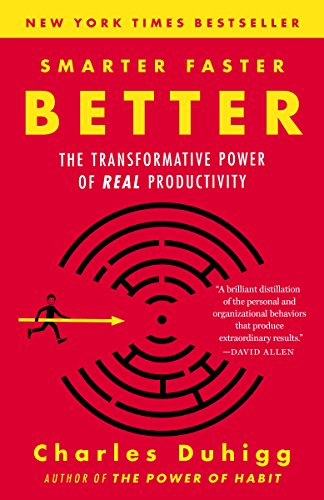Why is it seemingly impossible to stay on schedule? It seems that no matter how hard you try, no matter how many gorgeous agendas and planners you buy, how many to-do lists you write, you always end up falling behind or giving up entirely.
The problem could be with your schedule, not you. You’re not missing a mysterious gene that some people lucked out on. Following a schedule and being as efficient as possible is something that can be learned. More importantly, it’s something that you can unlock once you know the way in.

Smarter Faster Better
by Charles Duhigg
⏱ 15 minutes reading time
🎧 Audio version available
Give Your Current Task All Your Undivided Attention
“Multitasking” is this fanciful myth that the business world came up with. It’s considered a strength of character when you say you’re able to multitask. In reality, multitasking may be the culprit behind making you mess up. In fact, it even decreases your productivity and efficiency.
Give each task you do your undivided attention. That means no writing a report with one hand and replying to emails with the next. Both jobs will be over a lot quicker individually.
In addition, giving something your complete, uninterrupted attention falls under the umbrella of not doing a break mid-task. Even been in the middle of something and decided to give your mind a “rest” by sneaking in a little Instagram/Pinterest break? You may think this rejuvenates your brain, but it’s doing the opposite.
Take it from the excerpts. Craig Jarrow, the one behind the book “Time Management Ninja,” says that “One of the keys to keeping a balanced schedule is to actively focus on what you are doing at any given point in time. Remember, you scheduled items into your calendar so everything wouldn’t happen at the same time!”
By now, you may think that this is already sounding too challenging. How could one person consistently stay completely focused on one task for several tasks? Well, who said they have to follow one another?
The best thing about making your own schedule is having the freedom to schedule productive breaks into it. If you know your mind needs a rest every once in a while, make it a thing in your calendar: Instagram break. Pause for coffee. An hour dedicated to taking a walk.
This way, you don’t fall behind when you inevitably need to take a breather.
Create Realistic Deadlines
There’s an amazing world out there when you can get everything done in under an hour and have the rest of the day to yourself to clock out early and see a movie, but alas, travelling to parallel universes still hasn’t been invented, and we have to make do with the world that we have, which is creating realistic deadlines is the way to go to stay on track.
Instead of overloading your schedule and thinking– and often failing– to fit a stressful amount of tasks into one day, coming up with realistic, reachable deadlines will save you a lot of headaches.
If you know this task will take over an hour, allow yourself to even schedule a bigger time slot in the schedule to make sure timing doesn’t overlap. Most notably, don’t be afraid to forgive yourself if the task does take more than its given time. Never stop moving. None of it is wasted time. And next time, you’ll know how much time to appoint it.
Experts recommend the “top-down approach,” which is first figuring out what work needs to be done and by what deadlines. After that, with a deadline in mind, you’ll have a productive schedule that gently pressures you to keep going.
Not all tasks are equal. Sorting documents, while maybe monotonous, can take longer than filling out a report. To avoid frustration, add in an extra, cushy 10 to 15 minute pause between each task, giving yourself some essential wiggle room to fall back on.
Tackle the Hard Tasks First
It may be tempting to schedule the simple, less-time consuming stuff first, just to get them out of the way. However, tackling your hardest, most challenging tasks first thing will magically make the rest of your schedule go over smoother, if you believe it!
During those early morning hours, you’re at your most optimistic, most energetic. It’s the ideal time to sit down and enter a laser focus zone. Scheduling tasks during this time where you’re less likely to be distracted, especially by things further in the day, works wonders.
A lot of people find that those hours between the early morning hours such as 5 or 6 a.m are their best uninterrupted time, and they use this time to get the most important things done. Trust us, you’ll get more done this way.
Take Baby
No one starts out on their schedule journeys and immediately follows a schedule that’s exact or strenuous as, for example, Oprah’s or Elon Musk. These figures have had years to perfect their schedules and what works for them.
For now, the trick is to start small and figure out what’s best for you. Yes, there’s a rush of energy inside you right now that makes you impulsively decide to upheaval your entire routine and revisit all choices.
But guess what? The bigger, the more dramatic you go, the harder it is to keep up with the follow up.
That’s why starting with baby steps is integral. Try incorporating one new habit or trick into your daily schedule at a time. It takes anywhere from 18 to 66 average days to successfully form a habit. Sticking to a schedule is a process, not just something that clicks. Pace yourself.
It may help to follow a predetermined method to find your footing. There’s the MIT method, which stands for the Most Important Task. As we mentioned earlier, the most important tasks are best placed at the top of your to-do list. The MIT method calls for locating one to three of the most vital things you need to tackle and urges you to tackle them first.
Can’t get your mind to focus on a single task? Try the 90-minute cycle. Like any other human being, most people struggle with keeping the same level of concentration throughout the day. It’s normal. Expected. That’s why it’s smarter to arrange your schedule around these periods of when you expect to be productive and when you know you’re likely to need a break.
Arrange 90-minute periods of productivity and promise yourself a rewarding 20 minute break. You never know. Maybe your mind will find it easier to focus when you know a break is coming up soon.
Figure Out Why Your First Schedule Didn’t Stick
If you’re here, it’s probably because you tried following a schedule before and failed or found it not efficient enough. The trick to getting it right on the next try is learning from your past mistakes and figuring out why it didn’t work the way you wanted the first time.
There’s a root cause for these problems. Here’s an example: can’t get to the first task on your to-do list because you can’t bring yourself to wake up early enough? Do you struggle every morning to drag yourself out of bed and feel motivated enough?
The problem, like we said at the beginning, may not be with you, but with your schedule. Follow the strings. Why can’t you wake up early? Even if you try and fail every day for months at a time, you’ll never get anywhere until you figure out why.
Then when you do, change your schedule accordingly to ensure the best results. Ask yourself a series of questions to trace the root of the problem. Why can’t you wake up at the expected time? It could be because you’re tired. And why are you tired? The answer may be because you didn’t get enough sleep last night.
So now, you know, you need to get more sleep.
What if you say “I didn’t get enough sleep because I was up finishing some important tasks?”
Ask yourself why again. Why do you have so many things that push your bedtime? It could be because you can’t finish them. Why? Because your schedule contains more items than you can realistically get done during the day. And there you have it! Another root.
Your bedtime is tied to when you wake up to how productive you are. You may also realize that you often underestimate the time needed to accomplish items in your to-do list.
This trick helps you realise that basically, all your habits are essentially tied to each other. While some have stronger links to each other, and others don’t, cultivating healthy habits that actually reinforce each other will make shifting to an organized schedule seamless.
What Is Snapreads?

With the Snapreads app, you get the key insights from the best nonfiction books in minutes, not hours or days. Our experts transform these books into quick, memorable, easy-to-understand insights you can read when you have the time or listen to them on the go.


